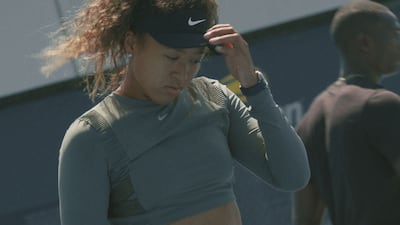Over the last few years, athletes across the world have made it abundantly clear that they’re no longer willing to just do their talking on the field, pitch and court.
The likes of LeBron James, Megan Rapinoe, Lewis Hamilton, Gwen Berry, and Marcus Rashford, to name but a few, have used their positions of prominence to raise awareness and protest against inequality. Especially in the wake of the murder of George Floyd in Minneapolis and the worldwide rise of the Black Lives Matter movement.
Tennis star Naomi Osaka has been as much of an activist as any athlete. She even wore seven different face masks on her way to winning the 2020 US Open, each of which was adorned with the name of a victim of racial injustice and police brutality.
Osaka’s fight to find her voice, while becoming the number one female tennis player in the world and a four-time Grand Slam singles champion, is exactly what makes her three-part Netflix docu-series, simply titled Naomi Osaka, so riveting.
Acclaimed director Garrett Bradley was given unprecedented access to the rising star over the course of two years. During this time, Osaka looked to follow up her stunning victory over Serena Williams in the 2018 US Open, struggled to find consistency, and had to deal with the death of her mentor Kobe Bryant and the spread of Covid-19.
What makes Naomi Osaka so engrossing and hypnotic is that Bradley never sensationalises or exaggerates what Osaka is going through. Instead, Bradley takes a more patient, reflective and authentic approach. Jon Nelson’s cinematography is intimate and profound, as well as respectful. Devonte Hynes and Theodosia Roussos’ music is pitch-perfect at every point, adding weight to the various emotional sequences, while propelling it forward when required, too.

It’s Osaka that proves to be the most captivating aspect of the docu-series. Tennis fans will already be well aware that Osaka quit the French Open in June 2021, after she vowed not to participate in the post-match press conferences as she said they negatively affected her mental health. Naomi Osaka provides a deep and empathetic insight into her fragility and vulnerability. This is especially true of her fascinating voiceover, during which she utters a number of powerful and relatable comments on her struggles.
“The amount of attention I get is ridiculous. No one prepares you for that,” reflects Osaka in the opening episode, Rise, as we see her juggling her various matches and training with her endless media and publicity requests. Even though she obviously has a quiet personality and intense demeanour, Osaka still manages to come across as funny and personable with those in her inner circle.
But all of that changes with the second episode, Champion Mentality. Osaka recognises that she is failing to live up to her potential, and looks to find a ruthlessness and cutting edge that will turn her into a serial winner.
“I want to think about the future rather than being stuck in the present,” declares Osaka, who admits that she’s “used to being a chaser or a follower” and finds it “hard to be the top person.”
This just makes the final instalment, New Blueprint, all the more impactful. Osaka realises that she has to make her “own path,” and Bradley shows her doing so in a genuinely inspiring and uplifting manner.
By its conclusion, not only will you be convinced that Naomi Osaka is going to be the best tennis player of her generation, you’ll understand the responsibility and pressure that comes with being a sport star turned activist in 2021, and why they’re so important.
'Naomi Osaka' is available for streaming on Netflix

